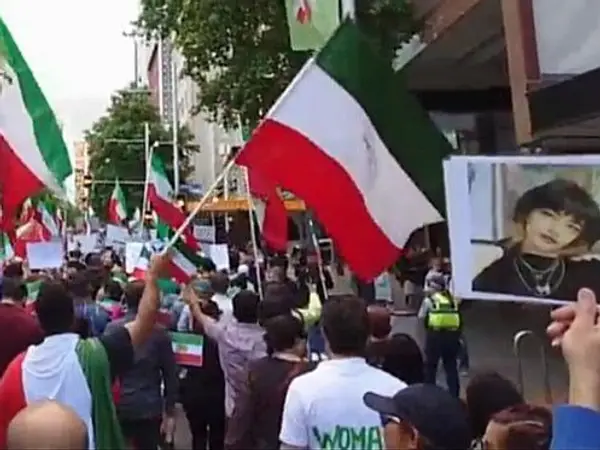University students in Iran Saturday held demonstrations in many cities, as diaspora communities continued their weekend rallies in support of the protest movement.
Students at Tehran Azad University of Research and Sciences held a sit-in publicizing that they will hold protests on December 7 to mark the annual Student Day in Iran.
Students at Kharazmi University also protested widespread campus food poisonings, chanting “They poison students, and now justify it.”
Within the past ten days, hundreds of students at universities of Esfahan, Arak, Allameh, and Karaj Kharazmi were poisoned after eating dining in cafeterias. Student groups have issued announcements saying that the food poisoning was intentional by authorities to keep them away from protests.
In Tehran University, students at the Faculty of Social Sciences also held a sit-in to protest a recent security beef-up and the restrictions on students.
Many students at Kordistan University also staged a sit-in to protest the arrest of their professors, Behrouz Chamanara.
Meanwhile, Iranians abroad organized gatherings to declare their opposition to the Islamic Republic. In Frankfurt and Melbourne, the “Run for Freedom” program was held with athletes running long distances, and in Brussels artists reflected the voice of Iranian people with dance and music.
Iranians living in Sweden gathered in the city of Gothenburg like in previous weeks and chanted slogans against the Islamic Republic.
Similar demonstrations were held in the city of Auckland in New Zealand, Istanbul, Rome, and Vienna.
Meanwhile, Iranian human rights activist Nargess Mohammadi, who is imprisoned in Tehran’s infamous Evin Prison urged Javaid Rehman, the UN special rapporteur for human rights in Iran to probe into sexual assaults on female detainees.
In a statement published on her Instagram Saturday, she said “Assaulting women during incarceration and in custody centers is part of the regime’s suppression plan against female protesters and fighters.”
Mohammadi added that there had been “numerous and horrifying” reports of female prisoners being assaulted and raped in Evin and Zanjan prisons between 2010 and 2020.
The Iranian activist also went on to say that she was “assaulted and insulted by jail and security authorities in Evin Prison” in 2010. She filed a lawsuit, but instead of justice being served, she received a two-and-a-half-year prison sentence as well as 80 lashes.
In another part of her letter, she called on Rehman, “to investigate, hold accountable and condemn the government, to prevent the continuation of this inhumane method to suppress protesting women and to take serious and quick action in this regard.”
There have been widespread reports of rapes and other sexual abuse being committed on women detainees, which is seen as part of the brutal crackdown on women protesters demanding freedoms.
In November, a network of activists with a mandate to follow up on the condition of detained protesters in Iran reported dire human rights violations such as torture and sexual abuse.
The “Volunteer Committee to Follow-Up on the Situation of Detainees” reported torture, sexual harassment, threats of rape, not having access to medical services, and the detention of some inmates in secret locations.
The report said a female prisoner has been openly threatened with rape. The interrogators told her and other detainees “If you are raped here, you cannot protest! If you want to get naked, and you must pay for it!” The government and its agents accuse anti-hijab protesters of improper attire and nudity.
